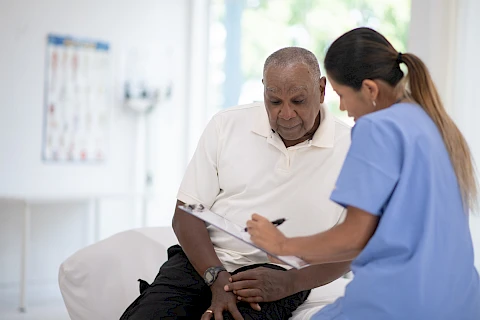
We recognize June as Men's Health Month, a time dedicated to raising awareness about health issues disproportionately affecting men. A crucial part of this initiative is educating men about the most common types of cancers they may face, particularly as they age. This article discusses the five most common types of cancer diagnoses among senior men. We provide essential information about each cancer type, including its prevalence, ways to reduce the risk, and the recommended screening frequency. By gaining this knowledge, senior men can take proactive steps to prevent these life-threatening diseases and promote their overall health and longevity.
Prostate Cancer
Prostate cancer ranks as the most common cancer among men, particularly those over 65. The American Cancer Society reports that approximately one in eight men receive a prostate cancer diagnosis during their lifetime. You can reduce the risk of this cancer by following these suggestions:
- Maintain a balanced diet rich in fruits, vegetables, and lean proteins.
- Exercise routinely. Make sure to discuss adding new exercise routines with your doctor.
- Regular screenings play a crucial role in early detection. Based on risk factors, men should consider starting annual prostate-specific antigen (PSA) tests at age 50 or earlier.
Lung Cancer
Lung cancer is the second most common cancer in senior men and the leading cause of cancer death among men. Seniors who smoke are particularly at risk. Quitting smoking at any age significantly reduces the risk of lung cancer. Regular exercise and a diet rich in fruits and vegetables help as well.
Doctors recommend low-dose computed tomography (LDCT) scans annually for those at a higher risk, such as long-term smokers, starting at age 55.
Colorectal Cancer
Colorectal cancer often affects men above the age of 50, making it one of the most common cancers among senior men. Lifestyle changes can dramatically reduce the risk of colorectal cancer:
- Maintain a healthy weight
- Exercise regularly
- Eat a high-fiber diet
- Start screening at age 50 with a colonoscopy every ten years or a fecal immunochemical test (FIT) annually.
Skin Cancer
Skin cancer is a common malignancy in senior men. However, it's also one of the most preventable forms of cancer. Staying in the shade during peak sunlight hours, wearing protective clothing, and routinely applying sunscreen reduces risk. Seniors should check their skin monthly for changes and get annual skin examinations from a healthcare provider.
Bladder Cancer
Bladder cancer predominantly affects older adults, with most diagnoses in men over 70. Smoking is a significant risk factor, so quitting is a great first step to prevention. Regular fluid intake, especially water, and a diet rich in fruits and vegetables may also help. Men with risk factors such as a history of smoking or exposure to certain chemicals should consider regular screenings as recommended by their healthcare provider.
We are Here to Help
Knowing and mitigating the risks of common cancers is a critical aspect of men's health, particularly for senior men. Regular screenings and a healthy lifestyle can significantly reduce risk and lead to early detection, often resulting in more successful treatment.
If you reside in Madison, Stoughton, Oregon, DeForest, or Verona and need information about senior men's health or support caring for your senior loved one, don't hesitate to contact us at Senior Helpers Madison. We would love to discuss our services for seniors and their caregivers, such as Personal Care and Chronic Disease Care.